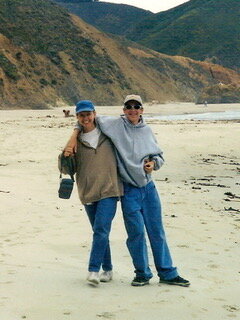My sister, Carol, lived in upstate New York, not far from the town she and I grew up in. She was a high honors student in high school, graduating valedictorian in her senior class, and receiving a full scholarship to an ivy-league university to study journalism. Something happened while she was away at school, but my brother and I, being several years younger, weren't privy to the hushed conversations between my parents and older siblings about just what was the matter. I knew Carol could be volatile and prone to outbursts of anger and irrational reasoning. I also knew she was creative and full of ideas about the world that I found intriguing and inspiring.
I left home at 17 when I went to college. I never really lived with my family after that, only returning home to visit on holidays. By then, my sister was living with a man with whom she bore a son. She held jobs — a staff writer for a magazine; a writing teacher at the local university. She wrote poetry, beautiful poetry. Writing and books were her love and her life. While family gatherings were often uncomfortable and awkward when she was around, I wasn't present to witness the worst of her behaviors, so I was unaware of just how seriously ill she was. I only knew she was "different,” but I loved her, loved her writing, loved her creativity, and loved my sister for herself.
It wasn't until several years later, after I had married, lived three states away, and my second child was an infant in my arms, that my mother called to tell me that they had to have Carol committed to the state psychiatric hospital. Just like mother's own brother, my uncle, my sister was involuntarily admitted to the same state hospital where he had lived many years before his death. I learned that my sister had inherited the family illness. Schizophrenia.
Details of the years following that first hospitalization are sketchy, at least from what I knew. On trips home to visit the family, I visited my sister in the hospital, in her home, and in the mental health outpatient center where she introduced me to her friends. I cried with her when her 12-year-old son was removed from her home by Child Protective Services and put into foster care where none of us were able to see him — due to legal restrictions and "conflict of interest" in our relationship with her. I rejoiced with her when she finally agreed to stay on medication, and when she found a psychiatrist who was willing to work with her — in her words, "Like a tinker, an alchemist" — until they found just the right combination of medication that would keep her stable for the next 20 years.
Even though she was medically stable, Carol still struggled daily to find her place in a world that couldn't see this woman — who I knew as a beautiful soul — as anything other than a cast-off and a mentally ill person. Medication would keep her stable, but she never could recover, and never be free of schizophrenia and many of the symptoms that medication could not erase. Sometimes the medication would fail and need to be readjusted, and she would regress. She aged prematurely, lost her teeth, was at times morbidly obese, and at others less so, often had a dulled expression, developed diabetes, and was violently assaulted in her own apartment by someone who took nothing from her but the medication she had in her purse. Yet, through it all, she maintained her generous nature and her creative drive to write poetry and fiction. I collaborated with her on compiling some of her poems into a hard-cover book with my photographs accompanying them. In the spring before she died, we self-published several copies to give to friends and family, and she was even able to sell a few. It had always been her dream to be published, and even though this wasn't the same as having her poems accepted by a large publishing company, she told me that she felt her dream had come true. It was the last good thing I was able to do for her.
A few years before Carol died, we began having long phone conversations. I was struggling with a crisis within my own family, and she alone was willing to listen any time, day or night, as I asked her probing questions to help me understand. She generously shared with me insights into her illness, and tried to help me understand what was impossible to comprehend. She would talk me through many of my darkest times, having a firsthand knowledge of the grief and helplessness that comes of seeing someone you love suffer. She was wise, giving, and forgiving. She was my rock of wisdom and support during those phone calls. At the other end of the line, when she spoke to me, my sister was complete and whole.
I visited her in her brand new apartment, which had been subsidized and furnished by charitable agencies. It was bright, with high ceilings, wood floors and big windows, with two bedrooms and clean furniture that had been provided for her. I stayed a weekend with her. We cooked meals together, went shopping together, and she talked about wanting to teach a writing class again. I had every hope and reason to believe that my sister was going to thrive.
A little less than a year later, Carol began to sound halting in our phone conversations, and would sometimes ramble without direction, or her speech would be slurred. She told me that she had begun to hear voices again, and that she was afraid she needed to have her medication adjusted. I encouraged her to do so soon. She promised me she would. She shared that she hadn't seen her psychiatrist in some time, but was going to make an appointment. I now know that she probably never followed through. I believe that she had digressed too far into the illness to be able to make that rational choice of action on her own. Severe mental illnesses such as schizophrenia take away a person's ability to reason clearly.
My own life situation took a dreadful turn, and I was preoccupied with trying to cope with things at home, so I didn't get down New York State to visit her that whole next year. When I finally did, nearly a year after she had moved into her new apartment, I found Carol lying naked on her couch. Her apartment had gone from a comfortable, homey, bright space to rooms full of clutter so deep I could hardly make my way through. Unwashed dishes and molding food filled the sink and covered the stove. Dirty laundry and dirty counter and table-tops, added filthy, unsanitary conditions, and cockroaches ran freely. How did this occur? I had to get help for her. With the help of her now-adult son and some other siblings, I got the numbers of her case manager and her former treatment providers. Not one of them would talk with me except to say, “Your sister is her own guardian and has the right to refuse treatment,” which apparently she did. Each and every one of them told me that she was entitled to make her own choices and there was nothing I or anyone else could do.
I knew, because she’d told me, that she feared being sent "back up to the Hill" which the state psychiatric hospital was called. I knew she feared being in a locked ward and forced into treatment. I knew she’d lapsed into a state of psychotic illness, and I couldn’t prevent her downfall nor convince her that treatment, voluntary or involuntary, was exactly what she desperately needed.
A visiting nurse knocked on the door, while I was there, to deliver insulin which my sister was responsible for administering to herself. The nurse tested her blood sugar levels. They were way above normal. While my sister sat outside on the deck and stabbed her arm with the needle of insulin the nurse had given her, I took the nurse into the apartment. Amidst the filth, we discovered several vials of unopened insulin, evidence that she hadn't taken her diabetes medication and, of course, it was obvious that she hadn't taken her anti-psychotic medication. Another woman came to the door from Meals on Wheels. When she saw me at the door, she thrust the warm tray into my hands, and turned and ran down the stairs. It was clear she’d come to this door before and she was grateful that, this time, she didn't need to do more than deliver and run.
I begged the nurse to please help me help my sister. It was obvious Carol needed to be on medication, and back into treatment. I thought, if I could just make her look around and acknowledge my sister was in need, surely she would make a report and help me get my sister the help. The nurse said what every other care provider I’d called for the past month said: "Your sister is clearly in need, but she's her own guardian, and if she refuses treatment, there is nothing anyone can do."
I left my sister in that horrible state, in that unsanitary, unsafe condition, with my heart broken. I returned home, promising her I was going to continue to call her and stay in touch. I promised myself I wouldn’t give up trying to persuade someone — anyone — to get her out of there and into treatment.
A week or two later, I received a phone call from Carol’s son that she’d been taken by ambulance to the hospital with a serious lung infection. In her absence, her landlord visited her apartment and began eviction proceedings. The city inspectors pronounced the entire apartment building "condemned" due to the untenable conditions which presented a health hazard to the other tenants. While this news was devastating to my sister, upon learning that all of her possessions were to be disposed of, the upside was that she was now deemed homeless, and social services could finally intervene. She couldn't be discharged from the hospital without a place to live. She was placed in a group home for seniors. Although she was only 63 years old, she appeared to be much older.
Back on psychiatric medication, her ability to reason began to return. In one of our last phone conversations, Carol shared that she felt life returning within her, that she felt like she was awakening from a bad dream. She said to me, "I don't know how I got so bad. I was doing so well. How did things get so bad?" I told her we all knew she was going downhill and we tried to help her, but she refused help. There was nothing family members could do. Her next words were among the last she ever spoke to me. "They should have let you help me. I wasn't in my right mind."
"They should have let you help me. I wasn't in my right mind."
Less than a month later, the infection in my sister's lungs, which I have no doubt began as a result of living in the unhealthy condition of her apartment, progressed into pneumonia. The doctors said they’d never seen a case of pneumonia so invasive. Despite their efforts, they couldn't clear her of the infection. After a week of intensive care, it developed into sepsis and took her life.
All our efforts to rescue her were futile, and had been all the while she was descending into the illness she couldn't manage on her own. She could have been stabilized if the laws, designed to protect her civil rights, hadn’t prevented those who loved her most from getting her into care.
"They should have let you help me. I wasn't in my right mind."
Those words will haunt me until the end of my days. Those words are why I believe that families need to be listened to. Families, regardless of whether they have legal guardianship or not, should have the right to intervene and get their loved ones to treatment when they see the need. They’re the ones who see the signs first and most clearly.
My sister’s death is why I believe that so many, who are left to "die with their rights on," are rather, in truth, denied their right to live because of our current restrictive laws. Carol’s last words to me continue to be my inspiration. They inspire me to fight for treatment for the seriously mentally ill who are unable to help themselves.
"They should have let you help me. I wasn't in my right mind."














